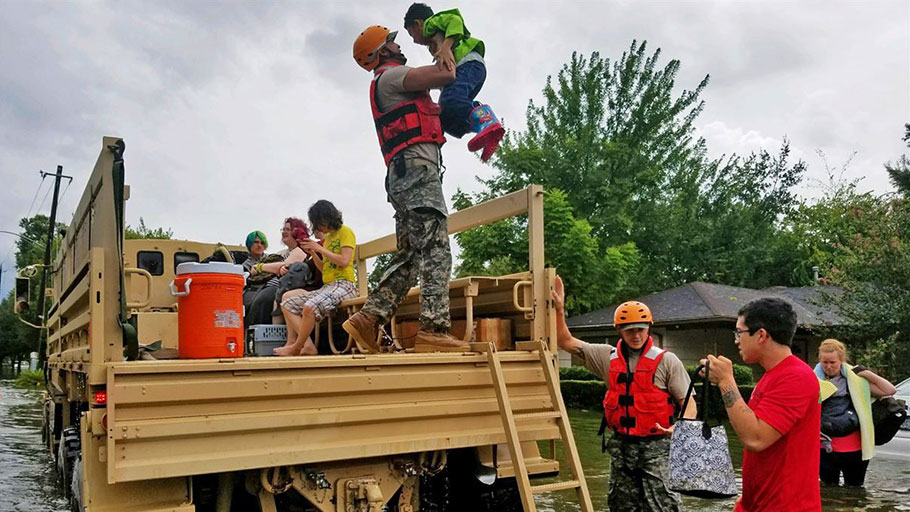Stranded communities are “literally getting gassed by these chemicals.”
By Amy Goodman, Democracy Now! —
Concern continues to grow over the environmental impact of Hurricane Harvey on the Houston area, home to more than a dozen oil refineries. The group Air Alliance Houston is warning the shutdown of the petrochemical plants will send more than 1 million pounds of harmful pollution into the air. Residents of Houston’s industrial communities have reported unbearable chemical-like smells coming from the many plants nearby. Stranded communities are “literally getting gassed by these chemicals,” according to Bryan Parras, an activist at the environmental justice group t.e.j.a.s. Those closest to these sites in Houston are disproportionately low-income and minority communities. We speak with Dr. Robert Bullard, known as the “father of environmental justice.” He is currently a distinguished professor at Texas Southern University. Dr. Bullard speaks to us from his home in Houston, which he needs to evacuate later this morning due to the rising Brazos River.
Transcript
This is a rush transcript. Copy may not be in its final form.
AMY GOODMAN: Dr. Bullard, I want to talk about this issue of justice. You live in the fourth-largest city in the country, Houston. The most diverse city in the country, Houston. And it is the “petro metro.” That’s right, the Houston area home to more than a dozen oil refineries. The group Air Alliance Houston warning the shutdown of the petrochemical plants will send more than a million pounds of harmful pollution into the air. Residents of Houston’s industrial communities already reporting unbearable chemical-like smells coming from the many plants nearby.
Yesterday, we interviewed Bryan Parras with the group t.e.j.a.s., the environmental justice group, who said, “Fenceline communities can’t leave or evacuate, so they are literally getting gassed by these chemicals.” This is an issue you have dealt with for a long time, from New Orleans to Baton Rouge to Houston, Professor Bullard. The communities closest to these petrochemical sites in Houston, disproportionately low income and minority.
You have Saturday, as we reported in the lead, a massive fuel storage at Kinder Morgan’s Pasadena terminal, spilling after being toppled in the storm. The tank held 6.3 million gallons of gasoline, but unclear how much gas leaked. Can you talk about the significance of where people live and the disproportionate impact of climate change on communities of color and poorer communities?
DR. ROBERT BULLARD: Well, the best predictor of health and well-being in our society, and including Houston, is ZIP Code. You tell me your ZIP Code, I can tell you how healthy you are. And one of the best predictors of environmental vulnerability is ZIP Code and race. And all communities are not created equal. Houston’s people of color communities historically have borne the burden for environmental pollution, and also the impact of flooding and other kinds of natural and man-made disasters.
When we talk about the impact of sea level rise and we talk about the impacts of climate change, you’re talking about a disproportionate impact on communities of color, on poor people, on people who don’t have health insurance, communities that don’t have access to food and grocery stores. So you talk about mapping vulnerability and mapping this disaster and the impact, not just the loss of housing and loss of jobs, but also the impact of having pollution and these spills, and the oil and chemicals going into the water, and who is living closest to these hazards?
Historically, even before Harvey, before this storm, before this flood, people of color in Houston bore a disproportionate burden of having to live next to, surrounded by, these very dangerous chemicals. And so you talk about these chemical hotspots, these sacrifice zones. Those are the communities that are people of color.
Houston is the fourth-largest city, but it’s the only city that does not have zoning. And what it has is—communities of color and poor communities have been unofficially zoned as compatible with pollution. And we say that is—we have a name for it. We call that environmental injustice and environmental racism. It is that plain and it’s just that simple.
And so this flood in Houston is exacerbating existing disparities, so that is why I say we have to talk about—when we talk about moving past the flooding part, and moving to cleanup and recovery and rebuilding, we have to build in environmental and economic justice into that formula. Otherwise, we will be rebuilding on inequity. We say that’s unacceptable.
AMY GOODMAN: Dr. Bullock, we only have 30 seconds. But your own situation now, you are being forced to move?
DR. ROBERT BULLARD: I am being forced to move because of the rising Brazos River. It is supposed to crest at 59 feet. And so I live in an area where we have been told we have to evacuate. And so I am packing up right now and getting ready to leave out of here. And so, it doesn’t—there is nobody in this town that this flood has not touched. And so, that is the nature of and the horrific—how this has touched so many people. And we have to do the right thing.
AMY GOODMAN: Dr. Robert Bullard, we want to thank you for being with us. Father of environmental justice movement, as he talks about environmental racism. Currently Distinguished Professor at Texas Southern University. This is Democracy Now!. When we come back, how is this affecting undocumented immigrants? As President Trump heads to Texas today, it is also said he is threatening to end DACAimminently. 85,000 residents in Houston are under DACA, meaning they can live and work legally in Houston. What does this mean for them right now?
Stay with us.
Amy Goodman is the host of Democracy Now!, a daily international TV/radio news hour airing on more than 1,200 stations in North America. She is the co-author of The Silenced Majority, a New York Times best-seller.














